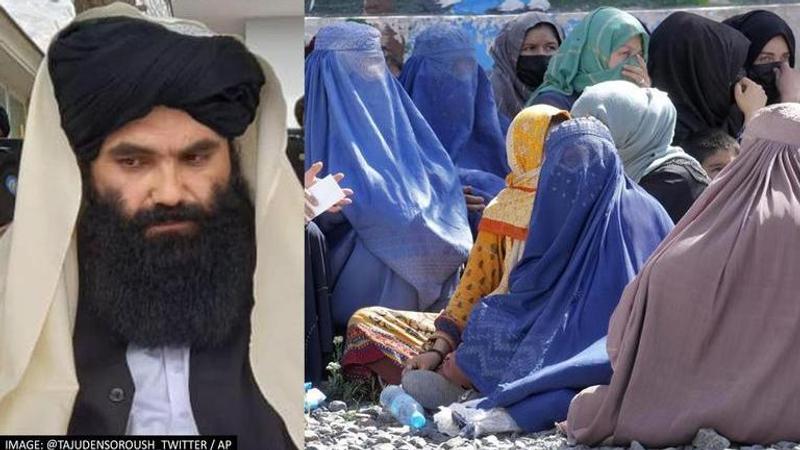Published 21:22 IST, May 22nd 2022
Taliban leader wanted by FBI promises women's rights; avers 'naughty women will stay home'
"By saying naughty women, it was joke referring to those women who are controlled by some other sides," Taliban's Haqqani, a designated global terrorist, said.

A top Taliban leader who is wanted by the FBI and has been classified by the US State Department as a "specially designated global terrorist", in a controversial stance, said that while the Taliban — the hardline Islamic faction — is “considering” allowing the girls back into high school and pursue education, the regime will have to keep “naughty women” at home.
In his first on-camera interview with Western news media, revealing his face to the public for the first time with CNN's Christiane Amanpour in Kabul, Afghanistan’s so-called acting interior minister and the Taliban's co-deputy leader Sirajuddin Haqqani said that there was “a good news.” He then threw light on the prospect of allowing women to attend secondary schools in Afghanistan, and be entitled to education like the men.
When asked that the Afghan women were “afraid to leave their homes” under the orthodox and stringent Talibani rule, particularly after the Islamic regime reversed the decision of reopening schools for the Afghan women, Haqqani said with a laugh: "We keep naughty women at home.”
He was referring to the women in Afghanistan who protested against the regime's restrictions on their fundamental rights, such as education. Sirajuddin Haqqani did not elaborate on why he chose to label the women who demanded the right to education and questioned the Taliban’s discriminatory laws as “naughty.” And under what laws would those women be prohibited from “moving out of their homes.”
"By saying naughty women, it was a joke referring to those naughty women who are controlled by some other sides to bring the current government into question,” Haqqani clarified to CNN's Christiane Amanpour.
The Talibani official underscored “parameters” for the women to live and work in Kabul. He noted that the Afghan women were required to adhere to the “Taliban's interpretation” of Islamic law and "national, cultural and traditional principles.”
“They are allowed to work within their own framework,” Haqqani, who has a $10 million bounty, said. He also explained that there was “no one opposed to (girls') education" in the Afghan government. He backed the claim by saying that the girls up to grade 6 were allowed to go to school. “The work is continuing on a mechanism,” he continued. "Very soon, you will hear very good news about this issue, God willing," he said, without mentioning the date and the reason for the delay. Via his interview, Haqqani’s aides said, Taliban aimed to start a new chapter in relations with the US and the globe.
Afghan women lash out at Taliban 'taking all their freedoms'
While Haqqani made “promises” of sending women back to school, the Afghan females expressed condemnation of Taliban regime, who they said was involved in stifling their voices, and squashing their rights. Taliban government has curtailed the rights of women and girls since seizing Afghanistan last August, said 19-year-old Maryam, adding that mid-aged women have “lost all hopes.”
"Their entire government [is] against girls' education,” she said.
"I don't believe that the Taliban will fulfil their promises. They don't understand our feelings,” Maryam told CNN. "Step by step they are taking all our freedoms," Fatima, 17, meanwhile, said. "The Taliban now and the Taliban of the 90s are the same — I don't see any change on their policy and rules,” she iterated, adding, "Our only hope is the international community brings extreme pressure on the Taliban to allow girls to go to school. Nothing else [will] work."
"Everyone from the Taliban leadership has zero credibility on this issue," Heather Barr, associate director of the Women's Rights Division at international watchdog Human Rights Watch, separately said in her statement.
"They [Taliban] have made representations about their supposed respect for women and girls," since taking power, Heather Barr, associate director of the Women's Rights Division at international watchdog Human Rights Watch, said. "Every day after that there was a new crackdown on women, and that's continued to intensify over time," she added.
Updated 21:22 IST, May 22nd 2022




